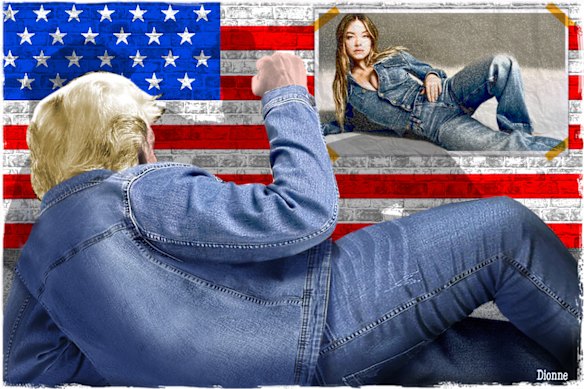
Sydney Sweeney has ignited a heated debate following her appearance in a controversial advertisement for American Eagle jeans. The ad, which plays on the phrase “great genes,” has drawn criticism for its perceived racial undertones and lack of diversity. Released in March 2023, the campaign quickly garnered attention, with many interpreting Sweeney’s portrayal as emblematic of a broader racial insensitivity within advertising.
In the ad, Sweeney models blue jeans while stating, “Genes are passed down from parents to offspring, often determining traits like hair colour, personality, and even eye colour.” She then turns to the camera and adds, “My jeans are blue,” a line that some viewers interpreted as a thinly veiled reference to racial identity. The juxtaposition of the terms “great genes” and her image as a conventionally attractive white woman has led to accusations of promoting a racially charged narrative.
The backlash intensified on social media, particularly on platforms like Tiktok, where a video by user @thealtperspective amassed over 1.8 million views. The video criticized the ad, stating it was “FULL of racist and fascist dog whistles,” and noted that it was circulating among certain online communities with comments like “we’re so back,” indicating a troubling embrace of racially insensitive rhetoric.
The controversy is set against a backdrop of ongoing discussions about race in America. Recently, President Joe Biden remarked on “a lot of bad genes” when addressing crime and illegal immigration, a comment that further complicated the public’s response to Sweeney’s ad. This connection has fueled claims that the advertisement reflects a troubling trend in media representation.
Critics argue that Sweeney’s portrayal, combined with the ad’s messaging, serves to reinforce stereotypes. The debate raises questions about the responsibility of brands in their choice of imagery and messaging, particularly in a time of heightened sensitivity to issues of race and representation.
Despite the backlash, the ad has also elicited support from some who view it as a clever marketing strategy designed to provoke conversation and increase visibility. The attention generated by the ad may translate into increased sales for American Eagle, as controversy often leads to heightened consumer interest.
The intersection of race, advertising, and celebrity culture has made Sweeney’s campaign a focal point for discussions about societal values and the impact of media. As conversations continue to unfold, the implications of this advertisement may resonate far beyond the fashion industry, reflecting deeper societal issues regarding identity and representation.
The conversation surrounding Sydney Sweeney and the American Eagle ad underscores the complexities of modern advertising, where the line between creative expression and social responsibility is increasingly scrutinized. As brands navigate this landscape, the ongoing dialogue about race and representation will undoubtedly shape future marketing strategies.







